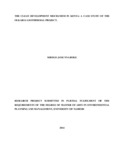| dc.description.abstract | The Clean Development Mechanism (CDM) is one of the key components of the Kyoto Protocol. Being an offshoot of the United Nations Framework Convention on Climate Change (UNFCCC), the Kyoto Protocol is a legally binding global agreement to combat climate change through a reduction of greenhouse gas (GHG) emissions as well as to help non annex one countries achieve sustainable development. The study used Olkaria Geothermal Project as case study to assess the contribution of CDM projects to sustainable development. Specific objectives were to assess the contribution of CDM projects towards community social development using community participation in decision making and women empowerment as indicators of social development; to determine the contribution of CDM projects to local environmental development; and to assess the contribution of CDM projects towards local economic development using employment creation and infrastructure improvement as indicators. The study adopted a survey research design witha target population of 9,194 households of Olkaria sub-location, where a sample of 75 households was drawn. Quantitative data was collected using semi structured questionnaire administered to households and unstructured questionnaires administered to 10 key informants (Olkaria Geothermal Project employees).The collected data was coded, cleaned and analyzed using SPSS (Statistical Package for Social Sciences) in which the hypotheses were also tested. From the findings, the study found out that the level of community engagement in decision making with regard to community development projects to be collaborative with the Olkaria Geothermal Project while the main mode of promoting women empowerment is through provision of scholarships to the girl child (at least two annually) for secondary and university education. The study also established that social afforestation and environmental awareness creation through environmental seminars and participation in important days in the environmental calendar were the major initiatives by the Project to enhance environmental development. The study also established that the Olkaria Geothermal Project engages the use of Environmental Management Plans to counter the effects of its activities on the environment followed by environmental audits. In its contribution to economic development the study established that the Project is involved in local community infrastructure improvement through provision of clean drinking water to the community, establishment of water pans for watering livestock, grading of community access roads and building and renovation of classrooms in some of the community schools. With regard to employment creation the study established that there are indirect income generation activities in the Project as well as direct employment. Employment opportunities for unskilled labour are reserved for the local community | en_US |

